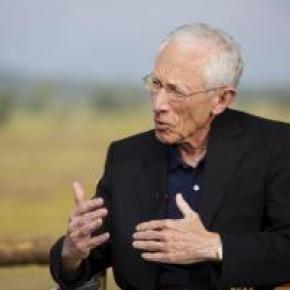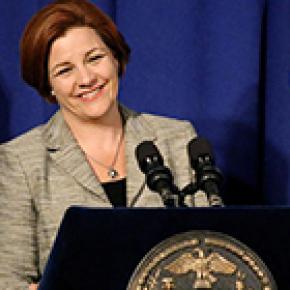Coalition Calls for Racial Equality in Kansas City Economy
KSHB - March 5, 2014 - Following a Department of Justice report showing the Ferguson Police Department unfairly targeted African-Americans, a Kansas City coalition says there are racial...
KSHB - March 5, 2014 - Following a Department of Justice report showing the Ferguson Police Department unfairly targeted African-Americans, a Kansas City coalition says there are racial inequalities right here.
They say a recent economic report shows twice as many African-Americans in Kansas and Missouri are unemployed than white residents and that wages are too low to support a family.
"Our purpose here today is to call for a moral economy where wages actually provide hope for workers and their families,” Stan Runnels, a priest and CCO member, said.
The group is asking policy makers for a change.
Source
A puzzle for central bankers: Solid growth but low inflation
Against a backdrop of strengthening growth but chronically low inflation, Federal Reserve Chair Janet Yellen and other central bankers are taking their measure of the global economy at their...
Against a backdrop of strengthening growth but chronically low inflation, Federal Reserve Chair Janet Yellen and other central bankers are taking their measure of the global economy at their annual conference in the shadow of Wyoming's Grand Teton Mountains.
With the prospect of new leadership at the Fed within months, investors will be listening for any hint of shifting interest rate plans from the policymakers. The most watched events will come Friday, when Yellen and Mario Draghi, head of the European Central Bank, will each address the conference.
Read the full article here.
Trump expected to nominate Powell for Fed chair
Most on Wall Street welcomed the news that Powell is the likely nominee. Investment bank Deutsche Bank put out a note last week to clients saying Powell would be the best choice if Trump did not...
Most on Wall Street welcomed the news that Powell is the likely nominee. Investment bank Deutsche Bank put out a note last week to clients saying Powell would be the best choice if Trump did not want to keep Yellen on. But some liberal groups, including Fed Up, were disappointed and see the selection of Powell as an attempt to make the Fed more favorable to big banks. "Jerome Powell's most important qualification is that he served with Janet Yellen. His confirmation should depend on his willingness to follow in Yellen's footsteps on both monetary and regulatory policy," said Shawn Sebastian, co-director of Fed Up, a campaign from the Center for Popular Democracy.
Read the full article here.
El premio de la diáspora boricua
“En el noreste, grupos de poder inmigrante como Make the Road, afiliadas al Center for Popular Democracy, organizan a estas comunidades en Nueva York, Connecticut, Pensilvania y Nueva Jersey para...
“En el noreste, grupos de poder inmigrante como Make the Road, afiliadas al Center for Popular Democracy, organizan a estas comunidades en Nueva York, Connecticut, Pensilvania y Nueva Jersey para crear un poder amplio en las minorías de esa parte de los EE.UU. Por otro lado, se han formado coaliciones nacionales como Power4Puerto Rico, que agrupan a muchos de estos grupos, incluyendo al Hispanic Federation, para cabildear por políticas públicas que tendrán un impacto directo en los puertorriqueños viviendo en la diáspora.
Lea el artículo completo aquí.
Fed says rate hike next month hinges on market volatility
Some top policymakers, including Fed Vice Chairman Stanley Fischer, said recent volatility in global markets could quickly ease and possibly pave the way for the U.S. rate hike, for which...
Some top policymakers, including Fed Vice Chairman Stanley Fischer, said recent volatility in global markets could quickly ease and possibly pave the way for the U.S. rate hike, for which investors, governments and central banks around the world are bracing.
With a key policy meeting set for Sept. 16-17, at least five Fed officials spoke publicly in what amounted to a jockeying for position on whether increasing the Fed's benchmark overnight lending rate was too risky amid an economic slowdown in China, a rising U.S. dollar .DXY and falling commodity prices XAU= CMCU3.
"It's early to tell," Fischer told CNBC on the sidelines of the annual central banking conference in Jackson Hole, Wyoming. "We're still watching how it unfolds." He, along with other Fed officials, acknowledged that the global equities sell-off that began last week would influence the timing of a rate hike, which until only a couple of weeks ago seemed increasingly likely to occur in September.
Concerns about China's economy have whipsawed markets, including Wall Street, even while U.S. economic data has been robust. U.S. stock indexes ended largely unchanged, capping a week that included both the market's worst day in four years and biggest two-day gain since the 2007-2009 financial crisis.
"I think they could settle fairly quickly," said Fischer, a close ally of Fed Chair Janet Yellen.
St. Louis Fed President James Bullard told Reuters he still favored hiking rates next month, though he added that his colleagues would be hesitant to do so if global markets continued to be volatile in mid-September.
The Fed's policy committee "does not like to move right in the middle of a global financial storm," Bullard, a Fed hawk, said in an interview. "So one of the advantages we have is that this storm is occurring now and, at least as of now, we think it will be settled down" by the September meeting.
The comments suggest the next two and a half weeks will be critical for the Fed as well as for global markets. A U.S. rate hike is expected to hit emerging market equities and currencies particularly hard, adding to the sell-offs already seen.
Source: Reuters
Despite Trump, State Progressives Advance Pro-Worker Policies

Despite Trump, State Progressives Advance Pro-Worker Policies
While the president goes on the attack, Democratic-controlled states and municipalities forge ahead.
...
While the president goes on the attack, Democratic-controlled states and municipalities forge ahead.
Read the full article here.
Clinton Wants Bankers Off Regional Fed Boards
Democratic presidential candidate Hillary Clinton joined the fray Thursday in the debate over how the nation’s central bank operates, saying banking industry insiders need to be removed from the...
Democratic presidential candidate Hillary Clinton joined the fray Thursday in the debate over how the nation’s central bank operates, saying banking industry insiders need to be removed from the Federal Reserve System.
Mrs. Clinton’s campaign said, if elected, she would appoint officials who will carry out “unwavering oversight” of the financial sector and “defend” both sides of the central bank’s inflation and employment mandates. The campaign also said “commonsense reforms—like getting bankers off the boards of regional Federal Reserve banks—are long overdue.”
Mrs. Clinton’s comments on central bank changes appeared to be her first on the topic in a campaign season where the Fed has intermittently been an issue, albeit mostly on the Republican side. Mrs. Clinton’s views emerged on a day in which dozens of Democratic congressional members, led by Sen. Elizabeth Warren of Massachusetts and Rep. John Conyers Jr. of Michigan, criticized the central bank for a leadership largely made up of white males with business and finance backgrounds.
While the Fed is led by its first-ever woman chief, all of its governors are white and three of the five are men. Of the 12 regional bank presidents, none are black and 10 are men. The last African-American to serve in a key leadership role left in 2006.
The letter to Ms. Yellen, referencing a recent study by the left-leaning Center for Popular Democracy’s Fed Up Coalition, also flagged a lack of diversity among the boards of directors that oversee the regional Fed banks. The letter said a Fed that doesn’t look like the nation it works for will struggle to make policy that benefits an increasingly diverse nation. Regional Fed board members are drawn from the private sector to watch over institutions that are quasi-private. By law, the boards are supposed to represent their broader communities with three classes of directors reserved for differing interests, including the financial sector, in a process set out by a complicated set of rules. These boards oversee regional Fed bank operations, provide local economic insights and help select new bank presidents.
But the presence of bankers on the boards, representing firms regulated by the Fed, has been a sore spot for Fed critics. Over the years, the New York Fed faced notable controversies on this front.
Recent legal changes have removed financial-market participants from the process of selecting new bank presidents. Also, the Fed’s regulatory operations are managed in Washington even as they operate out of regional banks, and are insulated from the influence of the regional boards. Most regional Fed boards are spoken of in glowing terms by their respective bank presidents.
Financial-market professionals are well represented among Fed leaders. Most top central bankers are either economists by training or former bankers. The leaders of the New York, Minneapolis, Dallas and Philadelphia Fed banks all have worked in some capacity for investment bank Goldman Sachs. Current Fed Vice Chairman Stanley Fischer was vice chairman of Citigroup from 2002 to 2005.
Mrs. Clinton’s desire to remove financial-sector leaders from the regional Fed boards would mark a historic change for a central bank that was founded on the mission of promoting financial stability, and whose monetary policy actions work through private financial-market channels to affect the performance of the broader economy.
In response to the congressional letter, the Fed said in a statement that when it comes to the members of the regional boards, “by law, we consider the interests of agriculture, commerce, industry, services, labor, and consumers. We also are aiming to increase ethnic and gender diversity.“ It also said there has been a rise in both racial and gender diversity on the regional Fed boards, with 46% of all directors now meeting the label of “diverse.”
A recent overhaul proposal by former top Fed staffer Andrew Levin, now a professor at Dartmouth College, called for the regional Fed banks to be made fully public, ending their private ownership structure operating within the Fed board, which is explicitly part of the government. Mr. Levin also called for directors representing firms regulated by the central bank to be removed.
By MICHAEL S. DERBY
Source
Five Long Island nonprofits to share $70,000 in grants

Five Long Island nonprofits to share $70,000 in grants
Five Long Island nonprofits concerned with progressive social change were awarded funding by the Long Island Unitarian Universalist Fund, which doled out $70,000 in its first round of grants for...
Five Long Island nonprofits concerned with progressive social change were awarded funding by the Long Island Unitarian Universalist Fund, which doled out $70,000 in its first round of grants for 2017. Three organizations received $15,000 apiece. These are the Center for Popular Democracy, which will use its award to organize elected officials on Long Island around progressive public policy solutions. The Child Care Council of Suffolk’s award has been earmarked for a graduate coalition for parents who have completed parent leadership initiative training, while the Pulse Center for Patient Safety and Advocacy will use its $15,000 award to train and empower African-Americans to advocate for better medical care.
Read full story here.
Puerto Ricans call for protest in Washington
“Convened by the Power4Puerto Rico coalition, refugees and civic and union groups have organized a day of protests - which could include acts of civil disobedience - and visits to offices of...
“Convened by the Power4Puerto Rico coalition, refugees and civic and union groups have organized a day of protests - which could include acts of civil disobedience - and visits to offices of members of Congress, to mark the six-month anniversary of the worst catastrophe the Island has faced in a century. The events, which begin on Monday evening, will be headed on Tuesday by a protest in front of the headquarters of FEMA in Washington DC, said Samy Nemir Olivares, spokesman for the Center for Popular Democracy.”
Read the full article here.
City Council overrides Mayor Bloomberg’s veto of paid-sick leave bill in early morning session
New York Daily News - June 27, 2013, by Tina Moore & Erin Durkin - The City Council overrode Mayor Bloomberg’s veto Thursday and made New York the largest city in the country to require paid...
New York Daily News - June 27, 2013, by Tina Moore & Erin Durkin - The City Council overrode Mayor Bloomberg’s veto Thursday and made New York the largest city in the country to require paid sick leave for workers.
The council also approved the city's new $70 billion budget, held Madison Square Garden at a 10-year operating permit and abolished a ban on brunch before noon at outdoor cafes.
The veto override came after a protracted battle over the paid sick-leave legislation that was first proposed in 2009.
Council Speaker Christine Quinn brought the bill to the floor for a vote in May under intense pressure from political opponents and labor unions. Bloomberg then vetoed the measure, saying it would damage businesses.
The legislation forces tens of thousands of city businesses with at least 20 employees to offer five paid sick days a year beginning in April 2014.
The following year, the mandate would extend to businesses with at least 15 workers.
One million workers eventually will be covered by the bill, which also prevents companies from firing employees for taking unpaid sick days.
Before the vote, bill sponsor Gale Brewer (D-Manhattan) led a rally on City Hall’s steps in support of the override, boasting that “nobody will be fired if they are ill."
Union Local 32BJ President Hector Figueroa said New York started a movement that would sweep across the country.
“We are going to take this legislation now to other states and other cities,” he said. “People don’t need to be worried anymore about losing their job because they have to take care of a loved one.”
The $70 billion budget passed by the Council does not include tax increases and provides $58 million for the New York City Housing Authority to avoid most of 500 threatened layoffs.
The plan also saves 20 fire companies that Bloomberg’s budget had proposed shutting, keeps city pools open and restores $144 million for thousands of child care and after-school seats that were at risk.
The Council also voted to give Madison Square Garden a 10-year permit to continue operating at its current location over Pennsylvania Station.
The Garden had requested permission to operate at the site in perpetuity. Last month, the city planning commission approved a 15-year extension.
But Quinn said finding a new home for the arena was the only way to build a new Penn Station and called for a commission to find a new location in Manhattan. A representative for the Garden declined to comment.
The council also voted to abolish a law that prevented cafes from serving brunch outdoors before noon, changing the start time to the a.m.
The old restriction was “silly and it’s outdated and deserves to be changed,” Councilman Dan Garodnick (D-Manhattan) said. “We have found that that rule is not really serving anybody. It is a burden on small business and it is an obstacle to the many brunch loving New Yorkers out there.”
Source










2 months ago
2 months ago